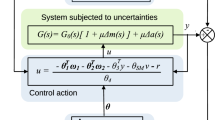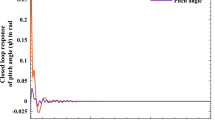Abstract
This paper addresses a nonsingular fast terminal sliding mode fault tolerant control (NFTSMFTC) scheme based on disturbance observer (DO) for a quadrotor UAV in the presence of external disturbances and actuator additive faults. Firstly, by analyzing the dynamic characteristics of a quadrotor UAV, the model is decoupled into outer-loop (position subsystem) and inner-loop (attitude subsystem). Secondly, the DO is utilized to deal with external disturbances and actuator additive faults effectively. Furthermore, nonsingular fast terminal sliding mode control (NFTSMC) can avoid the chattering problems of traditional sliding mode control (SMC) and singularity problems of terminal SMC. Moreover, compared with nonsingular terminal SMC, it behaves the faster convergence rate. So the NFTSMC method is applied to design controller. Finally, in the framework of Lyapunov theory, the stability of the closed-loop system is analyzed, and the tracking error is asymptotically stable. The effectiveness of the proposed control scheme is verified by simulation results.
Similar content being viewed by others
References
O. N. Sinan and O. Merit, “Feedback control strategies for quadrotor-type aerial robots,” Transactions of the Institute of Measurement and Control, vol. 38, no. 5, pp. 529–554, 2016.
J. J. Xiong and E. H. Zheng, “Position and attitude tracking control for a quadrotor UAV,” ISA Transactions, vol. 53, no. 3, pp. 725–731, 2014.
T. Tomic, K. Schmid, and P. Lutz, “Toward safely autonomous UAV: Research platform for indoor and outdoor urban search and rescue,” IEEE Robotics and Automation Magazine, vol. 19, no. 3, pp. 46–56, 2012.
F. Kendoul, “Survey of advances in guidance, navigation and control of unmanned quadrotor craft systems,” Journal of Field Robotics, vol. 29, no. 2, pp. 315–378, 2012.
O. U. Rehman, B. Fudan, and I. Petersen, “Uncertainty modeling and robust minimax LQR control of multivariable nonlinear systems with application to hypersonic flight,” Asian Journal of Control, vol. 14, no. 5, pp. 1180–1193, 2012.
Z. Pu, X. Tan, and G. Fan, “Uncertainty analysis and robust trajectory linearization control of a flexible airbreathing hypersonic vehicle,” Acta Astronautica, vol. 101, no. 1, pp. 16–32, 2014.
K. H. Ang, G. Chong, and Y. Li, “PID control system analysis, design and technology,” IEEE Transactions on Control Systems Technology, vol. 13, no. 4, pp. 559–576, 2005.
W. Jasim and D. Gu, “H∞ for quadrotor attitude stabilization,” IEEE UKACC International Conference on Control, pp. 19–24, 2012.
N. Koksal, H. An, and B. Fidan, “Backstepping-based adaptive control of a quadrotor UAV with guaranteed tracking performance,” ISA Transactions, vol. 105, pp. 98–110, 2020.
S. Zeghlache, A. Djerioui, and L. Benyettou, “Fault tolerant control for modified quadrotor via adaptive type-2 fuzzy backstepping subject to actuator faults,” ISA Transactions, vol. 95, pp. 330–345, 2019.
F. Chen, R. Jiang, and K. Zhang, “Robust backstepping sliding-mode control and observer-based fault estimation for a quadrotor UAV,” IEEE Transactions on Industrial Electronics, vol. 63, no. 8, pp. 5044–5096, 2016.
T. Li, Y. M. Zhang, and B. W. Gordon, “Nonlinear fault-tolerant control of a quadrotor UAV based on sliding mode control technique,” IFAC Proceedings Volumes, vol. 45, no. 20, pp. 1317–1322, 2012.
C. R. Avram, X. D. Zhang, and J. Muse, “Nonlinear adaptive fault-tolerant quadrotor altitude and attitude tracking with multiple actuator faults,” IEEE Transactions on Control Systems Technology, vol. 26, no. 2, pp. 701–707, 2018.
W. Q. Gong, B. Li, and Y. S. Yang, “Fixed-time integraltype sliding mode control for the quadrotor UAV attitude stabilization under actuator failures,” Aerospace Science and Technology, vol. 95, pp. 1–16, 2019.
X. Wu, B. Xiao, and Y. Qu, “Modeling and sliding mode-based attitude tracking control of a quadrotor UAV with time-varying mass,” ISA Transactions, vol. 19, pp. 30354–30361, 2019.
H. J. Jayakrishnan, “Position and attitude control of a quadrotor UAV using super twisting sliding mode,” IFAC-PapersOnLine, vol. 49, no. 1, pp. 284–289, 2016.
M. Vahdanipour and M. Khodabandeh, “Adaptive fractional order sliding mode control for a quadrotor with a varying load,” Aerospace Science and Technology, vol. 86, pp. 737–747, 2019.
H. Razmi and S. Afshinfar, “Neural network-based adaptive sliding mode control design for position and attitude control of a quadrotor UAV,” Aerospace Science and Technology, vol. 91, pp. 12–17, 2019.
W. C. Lei, C. Y. Li, and M. Z. Q. Chen, “Robust adaptive tracking control for quadrotors by combining PI and self-tuning regulator,” IEEE Transactions on Control Systems Technology, vol. 27, no. 6, pp. 2663–2671, 2019.
B. L. Tian and Z. Y. Zuo, “Multivariable finite time attitude control for quadrotor UAV: Theory and experimentation,” IEEE Transactions on Industrial Electronics, vol. 65, no. 3, pp. 2567–2577, 2017.
S. Islam, P. X. Liu, and A. Ei Saddik, “Nonlinear robust adaptive sliding mode control design for miniature unmanned multirotor aerial vehicle,” International Journal of Control, Automation, and Systems, vol. 15, no. 4, pp. 1661–1668, 2017.
M. Labbadi and M. Cherkaoui, “Robust adaptive backstepping fast terminal sliding mode controller for uncertain quadrotor UAV,” Aerospace Science and Technology, vol. 93, pp. 1–14, 2019.
X. Y. Shi, Y. H. Cheng, and S. M. Zhong, “Adaptive fractional-order SMC controller design for unmanned quadrotor helicopter under actuator fault and disturbances,” IEEE Access, vol. 8, pp. 103792–103802, 2020.
H. Rabiee, M. Ataei, and M. Ekramian, “Continuous nonsingular terminal sliding mode control based on adaptive sliding mode disturbance observer for uncertain nonlinear systems,” Automatica, vol. 109, pp. 1–14, 2019.
B. Wang, X. Yu, L. X. Mu, and Y. M. Zhang, “Disturbance observer-based adaptive fault-tolerant control for a quadrotor helicopter subject to parametric uncertainties and external disturbances,” Mechanical Systems and Signal Processing, vol. 120, no. 1, pp. 727–743, 2019.
X. M. Zheng, P. Li, and H. Y. Li, “Adaptive backstepping-based NTSM control for unmatched uncertain nonlinear systems,” Journal of Systems Engineering and Electronics, vol. 26, no. 3, pp. 557–564, 2015.
Y. Feng, X. H. Yu, and Z. H. Man, “Non-singular terminal sliding mode control of rigid manipulators,” Automatica, vol. 38, no. 12, pp. 2159–2167, 2002.
K. Eliker and W. D. Zhang, “Finite-time adaptive integral backstepping fast terminal sliding mode control application on quadrotor UAV,” International Journal of Control, Automation, and Systems, vol. 18, no. 2, pp. 415–430, 2019.
J. Liu, W. D. Gai, J. Zhang, and Y. X. Li, “Nonlinear adaptive backstepping with ESO for the quadrotor trajectory tracking control in the multiple disturbances,” International Journal of Control, Automation, and Systems, vol. 17, no. 11, pp. 2754–2768, 2019.
Funding
This research was supported by Natural Science Foundation of Hebei Province (F2020203105), National Natural Science Foundation of China (61503323).
Author information
Authors and Affiliations
Corresponding author
Additional information
Fang Wang received her M.S. degree in computational mathematics from Yanshan University, Hebei, China, in 2008. In 2014, she received a Ph.D. degree in control theory and control engineering from Tianjin University, Tianjin, China. She is currently an associate professor in Yanshan University. She is the author or coauthor of more than 30 papers in technical journals, and conferences. She has been involved in projects supported by the National Natural Science Foundation of China, the China Postdoctoral Science Foundation, and other important foundations. Her major research interests include nonlinear control theories, adaptive control, robust control, guidance, and control of aircraft.
Zhigang Ma received his B.S. degree from Changzhi University, Shanxi, China in 2019. Now, he is studying in Yanshan University for a Master’s degree and his research interest is quadrotor UAV control.
Hongmei Gao received her B.S. degree from Xinzhou Teachers University, Shanxi, China, in 2017. Now, she is studying in Yanshan University for a Master’s degree and her research interest is quadrotor UAV control.
Chao Zhou received his Ph.D. degree in mechanical engineering from Yanshan University, Qinhuangdao, China, in 2019. Now he is a Lecturer in Hebei Agricultural University, China. He is the author or coauthor of more than 15 papers in technical journals, and conferences. His research interests include metallurgy automatic, machinery design and theory, and highly efficient continuous casting technology.
Changchun Hua received his Ph.D. degree in electrical engineering from Yanshan University, Qinhuangdao, China, in 2005. He was a research Fellow in National University of Singapore from 2006 to 2007. From 2007 to 2009, he worked in Carleton University, Canada, funded by Province of Ontario Ministry of Research and Innovation Program. From 2009 to 2011, he worked in University of Duisburg-Essen, Germany, funded by Alexander von Humboldt Foundation. Now he is a full professor in Yanshan University, China. He is the author or coauthor of more than 110 papers in mathematical, technical journals, and conferences. His research interests are in nonlinear control systems, control systems design over network, teleoperation systems, and intelligent control.
Publisher’s Note
Springer Nature remains neutral with regard to jurisdictional claims in published maps and institutional affiliations.
Rights and permissions
About this article
Cite this article
Wang, F., Ma, Z., Gao, H. et al. Disturbance Observer-based Nonsingular Fast Terminal Sliding Mode Fault Tolerant Control of a Quadrotor UAV with External Disturbances and Actuator Faults. Int. J. Control Autom. Syst. 20, 1122–1130 (2022). https://doi.org/10.1007/s12555-020-0773-2
Received:
Revised:
Accepted:
Published:
Issue Date:
DOI: https://doi.org/10.1007/s12555-020-0773-2




